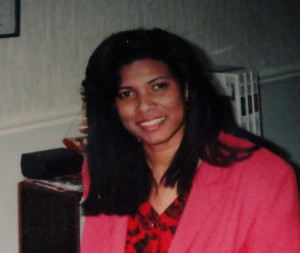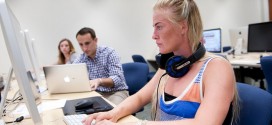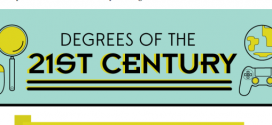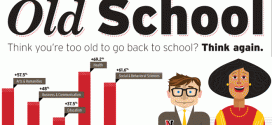Pauline Demetrius, 46, grew up on the northern coast of South America, in a remote area in the Guyana countryside. She spent her formative years in a house with her mother, sisters and an abusive alcoholic father who regularly told her that education wasn’t for girls. “We were supposed to stay at home and cook and wash the dishes,” she says. “So when I was 16, I dropped out of school.”
Her family was “dirt poor,” and while they had a radio, they didn’t have TV; the Internet was unheard of. It was her mother’s encouragement—and steadfast belief in the power and fundamental necessity of education—that changed the trajectory of Pauline’s life. “[My mother] believed the only way to get out of our situation was by educating ourselves,” Pauline says. “She never went to school herself, but she was street-smart, and she realized that she didn’t agree with my father. She knew she didn’t have the skills to get a job herself and gain independence, and she wanted me and my sisters not to be in the same situation.”
Unfortunately Pauline’s situation is not unique. While the Internet represents a vast democratization—from content to community to opportunity—there are still limits to who can and will benefit. A student in Beijing, China who wants to take part in an American MOOC can do so, but someone living in a rural Chinese village with little access to the

Despite her father’s belief that girls don’t need education, Pauline Demetrius is working on her master’s degree.
Internet doesn’t have the same chance to benefit. What’s more, the class and gender biases present in many cultures undercut an emphasis on equal access to education for all children.
Pauline was lucky in that she had a strong maternal example to drive her onward and upward. With her mother as an inspiration, Pauline did some local exploration, and found out about a typing school in a nearby town. She made a deal with the owner: she would scrub the building’s steps in exchange for lessons. She studied hard and her skills landed her a typing job at the Ministry of Education—a move that angered her father so much that Pauline had to temporarily move out of her home. Her first job led to another, at Guyana Airways, and a year later Pauline took her first trip—as an employee perk—to vis
it her high-school pen pal in Sweden. The door to a larger world that her typing lessons had cracked open now seemed to swing wide, and before long, Pauline moved to Canada. There, she worked three jobs as a single mother and enrolled in an online learning program to get her bachelor’s degree.
Pauline earned her degree in 2009 and hasn’t slowed down since. “The world is changing so much, and there is so much to learn, that you have to constantly educate yourself,” she says. Pauline now lives in Needham, Mass., with her husband and two children, and is working toward her master’s degree in Project Management at the College of Professional Studies (CPS). “I felt like I needed to learn more to get promoted at work, and constantly upgrade myself. I noticed a potential need at my job for a project manager and decided it was a field I could go into. Because I have two kids, and needed to be home and not travel a lot, I decided online education was for me, again.”
Pauline has taken four classes at CPS so far, studying topics like process planning and scheduling. “I am learning to structure projects effectively and all about the importance of the bottom line, so that I make workplace structures get to their bottom lines more efficiently,” she says.
Pauline can identify with others who grew up thinking—and being told—that education was not for them. She loves a piece she read on the Northeastern website about the idea that education should be a basic human right. “Without education, we cannot exist as a society,” she says. “I am very, very happy now. Even if I don’t get a job in this field, I’m happy to know I acquired this knowledge and can pass it along to my children and answer their questions with critical thinking. Hopefully they see how passionate I am about this field, and about education, and can apply it to their own lives.”
Pauline’s experience sparks the question: Who is entitled to an education? If we limit the answer to “Anyone who can access it,” we still rule out a vast number of students. And so the next question becomes: If we believe that “everyone” deserves the opportunity to participate in higher education, and we know that we can provide this—is it our duty to facilitate the connections that allow “everyone” access to the tools that make it happen?





From the poorest of countries to the richest of nations, education is the key to moving forward in any society. It is the most powerful weapon which you can use to change the world. Great job Pauline.